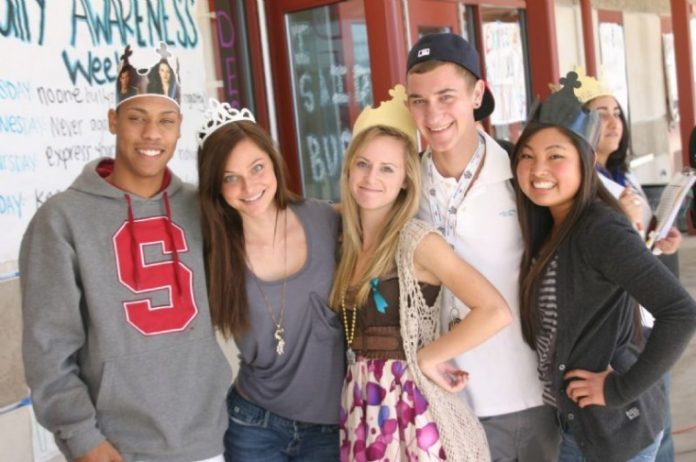Bullycide. It’s not found in any dictionary, but the new,
disturbing trend of teens committing suicide after being bullied
has gained national attention. What was once just a part of growing
up, bullying has become the impetus in wrecking lives.
Bullycide. It’s not found in any dictionary, but the new, disturbing trend of teens committing suicide after being bullied has gained national attention. What was once just a part of growing up, bullying has become the impetus in wrecking lives.
In just the past six months, at least six teenagers and even some preteens have committed suicide after being bullied about their sexuality at school or from cyber-bullying, or often in both forms.
A group of 33 seniors and one sophomore student at Ann Sobrato High School were affected so deeply by the recent suicides around the country that they hit the ground running with an anti-bullying campaign that ends today dedicated to educating their peers about the dangers that bullying triggers.
The students in the school’s inaugural peer-counseling class focused on teaching respect with the hope that the bullies, not their victims, would learn something.
“It’s tragic that it takes something like that to get people to realize,” Amethyst Aguilar, 17, said. “It’s opened our eyes. Even if one person learns something, then it’s worth the effort.”
Teacher Melanie Anvari created the class after seeing a need on campus for peer-on-peer counseling, though it was the students, not her, who had the idea of an anti-bullying campaign.
“They thought, ‘people don’t know what it looks like. How can we solve it?’ Awareness is the key thing. The goal is not to end bullying, but students need to know what it looks like,” Anvari said.
The class gave out 500 teal ribbons that represent “I pledge to be bully-free.” The teal is visible throughout Sobrato. “People are talking about it on campus. That’s progress,” she said.
Five peer counselors escaped class for a half hour to candidly discuss the real problems that Sobrato is facing head on. As seniors, they know the ins and outs on campus.
“The school has its cliques,” Emilie Nunez, 17, said. They agreed that eliminating cliques altogether is probably impossible, “but we want people to be accepting of one another, despite our differences.”
Every day of the week took on a new theme to display the gravity of the effects; today, students will dress up like hippies to “keep the peace” on campus. Wednesday, a set of fake tombstones lined the quad area with the alarming stories of teens pushed to suicide because they were bullied. Many students were seen wearing black to signify the “never again” theme.
The class, who call themselves the “Guiding Lights,” said it was a school rally that gave them some clarity about their influence.
“Everyone always boos the freshmen at the rallies. Always,” Nick Uherminie, 17, said. All five students nodded their heads up and down.
“It’s just sort of what you get as a freshman. It’s expected. But, we cheered for them. All the seniors clapped, cheered, stood up. Then, everyone else joined in. That’s never happened,” Tiffany Crader, 18, said.
“If they think you’re leaders, then why not leave a positive impact than a negative one?” Lherminie said.
That’s when the group realized they had the muscle to make an impact for good.
“We read the stories behind the teens being bullied who committed suicide and how they were feeling and what they were dealing with. To see some of those signs here … We don’t want anyone to feel alone,” Uherminie said.
The peer counselors have been trained by Anvari and the school’s counselors. The job is taken seriously. Confidentiality is paramount and students on both sides of the counseling sessions must sign release forms. Students can talk with a counselor about anything, not just bullying.
“If your parents are putting pressure on you about grades or you’re stressed out. Let’s talk about it. Sometimes it’s hard to talk to an adult about that stuff,” said Nika Burnett, 16. A senior, she taught a 30-minute advisory class Wednesday to a room of squirming, though mostly attentive, freshmen.
The class brainstormed the characteristics of a bully and were cognizant that bullies are likely suffering themselves, be it from a bad home situation or low self-esteem.
“Should you just let them bully?” Burnett asked the class.
They nearly yelled a resounding, “No!”
“Should we have a 10-foot rule so no one is near each other?” Burnett asked. Again, “No” they agreed.
“Everyone should just learn to not be such mean people,” one student said.
The Internet has created a lethal storm for teens. Stories like Jessica Logan’s, an 18-year-old from Cincinnati, are happening more frequently, with modern technology as the culprit. Logan had sent nude photos from her cell phone, called “sexting,” to an ex-boyfriend who forwarded the images around school. She later hanged herself.
The first viral incident of cyber-bullying and suicide was the 2006 death of Megan Meier in Missouri, who hanged herself in her bedroom closet after a MySpace hoax was created by a 13-year-old classmate’s mother, Lori Drew. Drew was indicted in 2008, but was acquitted in 2009.
States are strengthening anti-bullying legislation. The New Jersey Senate is advancing its “Anti-Bullying Bill of Rights” that would enforce the strictest laws against bullying in the nation. According to the bill, school administrators who don’t investigate bullying would be disciplined and bullying – harassment and intimidation – would result in a student’s suspension or expulsion. It’s a rule that’s already in place in Morgan Hill Unified. Students can be suspended or expelled for harassing another students, be it physical or verbal.
The bill gained momentum in New Jersey after Rutgers freshman Tyler Clementi made international headlines in September when he jumped off the George Washington Bridge, killing himself, after his roommate broadcast a video of Clementi making out with another man. The rash of teen suicides related to cyber-bullying has been referred to as a pandemic. It’s not just limited to schoolyard name calling, Sobrato students say.
“It’s not severe here, but it’s more about prevention and encouraging respect. A lot of it is friends putting down friends, and it can be taken in different ways,” Lindsay Strenefiel, 17, said. A new arm of cyber-bullying, FormSpring, is being used with a veil of anonymity. It’s similar to Facebook in that you post on a person’s “wall,” though users can leave anonymous posts. According to Sobrato students, who say FormSpring is popular on campus, it’s often used to spread rumors or bad-mouth their peers.
“People will blow each other up on there and it’s anonymous so it can be really terrible,” Lherminie said.
The students remain dedicated to spreading a message of respect at Sobrato. They’ve connected as a group – despite their diversity in dress, thoughts and interests – and it’s their hope their behavior will be role modeled.
“You don’t have to change yourself to fit in,” Nunez said. “You can look around and find someone similar or someone totally different who you get along with. You have to dig deep to find true friends, but they’re out there. We’re here to listen to you.”








